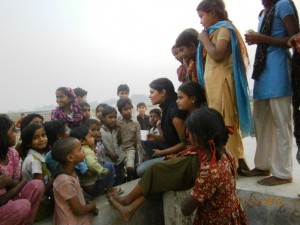Unwanted Musings
Contributed by: Angana Prasad
Dated: 14th December 2012
In the 3rd week of November, I had an opportunity to assist SUM1 +1ndia and Ecofemme, as a translator, for their project on safe hand washing and feminine hygiene, to Saraiya, U.P. Being a translator never sounded a lot of fun to me, but on taking this opportunity I realised how much of a responsibility it becomes to be a middle person, to receive, process and translate information and then receive, process and translate responses of the people. Any mistake on my part could have mis-fired the entire purpose. The hand washing part of the programme was pretty much of a cultural mix for me. Listening to an American discuss the concept of cleanliness and hygiene, processing it in my urban mind and voicing it out to our rural audience. When it came to working on feminine hygiene with an Australian and a Tamil lady, it was even more interesting to figure out that receiving information from a ‘firang’, processing it in my urban mind and delivering it to our rural audience, hadn’t altered the message/words/emotions in anyway.
This apart, one very strong realisation I had, was that with minimum five children each, mothers are tired of their motherhood. Every personal or group interaction I had with the women there, we there was at least 1 out of every 3 women expressing the same. Certain ladies even confessed that with not much scope for recreation, (no electricity, no tv) sex seems to be the best option after a hard day’s work. Contraception not being an agreeable option by the men and the woman not given the power to refuse, couples ended up having several children, many of them unplanned for or ‘unwanted’.
Being a student of Gender Studies, my first reaction was to do something for these women. Being powerless to do so, my concern as a Life Skills trainer for children and adolescents, however, led me to ponder more about the possible reasons for these ‘unwanted’ or ‘extra’ children.

Back in Lucknow, while conversing with a particular female beneficiary of our project, this ‘extra’ child or to put it as an ‘extra girl’ child hit me again. This young lady said that had been asked by her parents several times not to open her mouth ”tum chup hi raho toh achcha hai” (it’s best if you keep quiet). This came like a ‘sach ka saamna’ moment for me, as I have always been the most talkative kid in my entire khaandaan and my parents love showing me off to their family and friends just because of that. This statement, immediately explained to me all too clearly as to why that girl showed progress in her body language and participation in our sessions, but always shied away when it came to talking or expressing her understanding of the activity conducted.
Coming back to the Saraiya experience, another observation that I had during the last 2 days of my stay there was how 5 kids from the same family reached two opposite extremes of each other in self presentation and even behaviour. It seemed like the oldest kids were the best dressed, better behaved and very clean, but these qualities kept reducing with each successively younger sibling. I never knew how to ask their parents the reason for this huge variation, but my thoughts ran wild in every direction as to why this was the case. One reason could be that the first kid was special and ‘wanted’ and therefore a symbol of their love/passion/affection/whatever, the second kid also maybe a welcome one, (in a few cases) the third were sometime more good/neat/clean, but after that followed the train of ‘extras’ who with their running nose, dirty clothes and nest-like hair didn’t even seem to be from the same family. Not sure if this is correct or was there another possibility of increasing number of children leading to decrease on per person share in the family income? Or perhaps the elder ones just got new clothes and the younger ones only hand-me-downs. But that still didn’t explain the variation in behaviour and general unkemptness of the younger children. Since the purpose of the village visit was something else entirely which kept me busy, I never got time to enquire about this but I still wonder about this variation and the reasons for it.
It’s appalling how in the cities we celebrate the international day of women and men and father and mother and children and everything else and then there are places like Saraiya in which the celebration of relationships is more or less missing. Mothers are tired of their motherhood! :’(
These thoughts also now lead me to wonder whether we can do something about this through our KHEL program. For sure, we would already be imparting several benefits to these younger siblings who attend our sessions. We can already see changes in their behaviour and attitude. However, as agents of child development through sports, does our focus begins and ends at these kids or could we take the next step of working with parents?
It feels great when an expressive child or a teacher/coordinator from the partner school/organisation compliments us for providing the children a space for being themselves but we still don’t know if this space extends out of the KHEL sessions to the classrooms and, more importantly, when they reach home? My one concern is- what happens to the child who, on one hand, is being given their ‘KHEL space’ to be themselves and express themselves in so many ways while, one the other hand, they may be being controlled like herds once they are back home with no space or freedom for expression of themselves as individuals?
